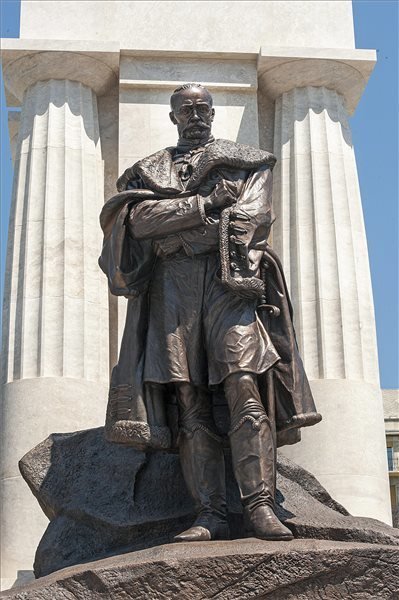Change language:
Re-Inaugurated Tisza Statue Symbolises “New Era Of Nation-Building”, Says PM

Budapest, June 9 (MTI) – Prime Minister Viktor Orban on Monday expressed hope that a re-erected statue of former Hungarian prime minister Istvan Tisza could be the “symbol of a new era of nation-building”.
 Tisza was prime minister of Hungary between 1903 and 1905, and from 1913 to 1917. He was assassinated in October 1918.
Tisza was prime minister of Hungary between 1903 and 1905, and from 1913 to 1917. He was assassinated in October 1918.
Speaking at the inauguration of the statue on Kossuth Square, near the parliament building, Orban said the re-erection marked the beginning of the new era for which the government had been working hard since 2010. In the last four years, Hungary’s honour has been restored and the foundation laid on which it again makes sense to speak about a Hungarian future in 21st-century Europe, he said.
“Today, when, once again, self-proclaimed democrats protect democracy from us, and they stir up trouble around us just because we don’t accept, without criticism, everything that the bureaucrats in Brussels tell us in Europe’s name, then we can say exactly what Istvan Tisza said: ‘I contritely confess, we stand on a national foundation,” Orban said.
“What is more, we can also contritely confess that we stand not only on national foundations, but on the side of freedom,” he added.
Tisza saw that political parties on the side of labour did not necessarily have to be communist or socialist, they could be national, too, Orban said. Tisza saw the solidarity shared between different members of the nation, a solidarity that was capable of bridging differences between classes, he added.
Orban noted that Tisza had initially opposed World War I even while everybody around him supported it. He was one of the few who saw that the short-term alternative to the monarchy was anarchy, which would lead to the break-up of Hungary.
Present at the inauguration were house speaker Laszlo Kover, former prime minister Peter Boross, church officials, ministers, MPs and members of the Tisza family.
The statue of Tisza stands close to the very same place where a statue of Mihaly Karolyi, who saw Tisza as his arch rival, stood before the recent reconstruction of Kossuth Square.
Photo: MTI – Peter Lakatos
Source: http://mtva.hu/hu/hungary-matters







